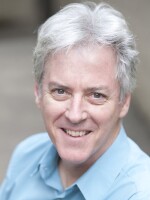The correct response to that headline is “well, duh…” But bear with me here; the clock I’m talking about is not mechanical, and does not hang on the wall. When public radio people say “clock,” they really mean “schedule.” And the changing of the clocks a few months back made for some changes in the news programming you hear on JPR.
Our colleagues at NPR had been working with affiliate stations across the country for some time to create more opportunities for local content in the NPR news magazines. And voila: as of November 17, 2014, the clocks changed for both Morning Edition and All Things Considered, creating a ripple effect on local stations and their programming choices.
Take a look at the Morning Edition clock shown here. You can see, first of all, why it’s called a clock: it’s a visual representation of the hour. And second, you can see how that hour is allocated… what NPR broadcasts at various points in the hour, and what is available for local stations to cover and replace with local material. By the way, I’m not committing industrial espionage… the clocks can be found easily on the Internet.
The top of each hour is pretty much what listeners had come to expect: a billboard setting up the contents of the hour ahead, lasting a full minute. That is followed by a network newscast (“Newscast 1”). Note the division at the four-minute mark: this is where you always hear the NPR newscaster say “This is NPR.” We have the option of leaving the network at that point, and we do, at 6 AM, 7 AM, and 8 AM. That’s when our own Barbara Dellenback jumps in and gives a local newscast instead of “Newscast 2;” it runs until 6:40 into the hour, followed by a 20-second network funding announcement and a 30-second local announcement.
Our colleagues at NPR had been working with affiliate stations across the country for some time to create more opportunities for local content in the NPR news magazines.
And you can see that if we did NOT take the news time, you’d hear more NPR news, followed by music. This is a little change, because NPR used to provide news where that music bed is now. The bigger changes come further into the hour: notice the positions of Newscasts 3 and 4 (from NPR)… at 19:00 and 42:00 into the hour. Morning Edition no longer provides a network newscast at the bottom of the hour, so at 6:30 AM, 7:30 AM, and 8:30 AM, you hear Barbara again with a short local newscast, RIGHT AFTER the billboard (don’t you love all the visual terms for audio items?).
So you get the overall approach now: shorter news breaks, but more often. For our purposes at JPR, there is now no single newscast in Morning Edition longer than two minutes and 40 seconds. But you get them twice an hour instead of once, for a net gain in minutes of news each hour.
And look at the space at 45:35 into the hour… this is the feature block, where we run longer audio features from JPR’s Liam Moriarty and other reporters from around the country. This is the place to get the kind of in-depth reporting you expect from Morning Edition, but from our corner of the world. Our regional features run at 6:45 AM (repeating at 8:45 AM) and 7:45 AM. These used to run closer to the bottom of the hour.
Beyond Morning Edition, the clock changes forced amendments to many other programs; that’s the ripple effect I wrote about earlier. Because the local news changed in length at the top of each hour, the clock for The Jefferson Exchange changed as well, but only by starting the
actual content of the program 50 seconds earlier. You’d have to literally set your watch by the program to notice the change.
But the clock changes made life challenging for JPR’s Eric Teel. In addition to being a talented broadcaster and our program director, Eric is the lucky guy who gets to tell our various computers to make all these changes. Okay, not “tell,” because they really don’t take verbal commands. A series of intricate computer instructions and many hours of implementing them kept Eric busy making sure everything happened at the right time when the new clocks took effect.
If you consume Morning Edition and its features online, none of this affects you. But if you listen on the air—especially as you get ready for action in the morning—you might have noticed that you hear Dave Mattingly with NPR News instead of Barbara Dellenback with weather at 19 minutes past the hour. She’s still there, just after the news. We hope you’re adapting to the rhythms of the new clock; it’s in place to give you a greater chance to keep up with the world while you move through it.
Geoffrey Riley began practicing journalism in the State of Jefferson nearly three decades ago, as a reporter and anchor for a Medford TV station. It was about the same time that he began listening to Jefferson Public Radio, and thought he might one day work there. He was right.





